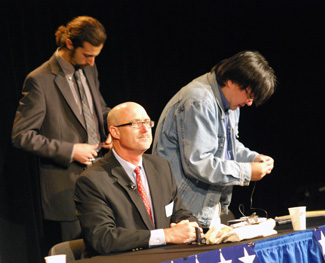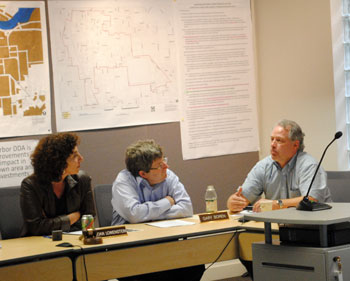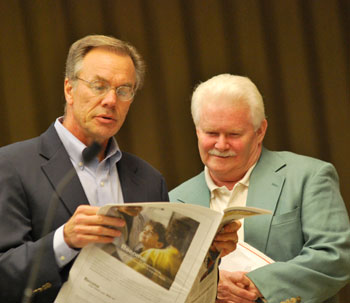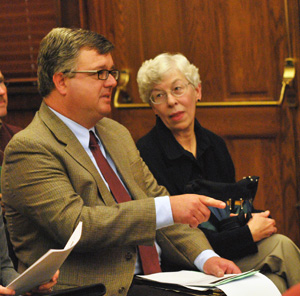The building formerly known as Ann Arbor News now boasting new Credit Union signs [photo] A last look at the old building sign, from a couple months back [photo]
Archive for October, 2010
A2: Food
The Detroit Free Press reports on Lunasa Market, a Web-based local-foods marketplace co-founded by Chelsea residents Dawn Thompson and Jane Pacheco. From the report: “Vendors and shoppers alike pay a $40 annual fee, which helps cover costs, including rent on the group’s Jackson Road warehouse. There, on the second and fourth Tuesday night of every month, the Lunasa in cyberspace transforms into a real-life collection of food-loving buyers and sellers, meeting over tables laden with high-quality products that customers can see, taste, touch and purchase. Much of what the purveyors bring to market was ordered and paid for earlier online by Lunasa shoppers. But most vendors also bring extra items that can be bought on the spot.” [Source]
A2: Power
Detroit Free Press columnist Tom Walsh lays out the reasons why Ann Arbor has become the power center of southeast Michigan, citing in part its role in the emerging “knowledge” economy: “Not even Ann Arbor could escape the economic storms that have ravaged Michigan, as the income numbers this past decade show. But it’s looking increasingly to be the most desirable address in the region, and maybe the state.” [Source]
A2: MC Frontalot
Ken Flagg, keyboard player for “nerdcore superstar” MC Frontalot, describes the band’s recent tour, including a show in Ann Arbor at the Blind Pig: “Another big thank you goes to the nerds of Ann Arbor who were instrumental in making this the break-even point for our tour. Ann Arbor FTW! Even more praise goes to Eli and Deanne Neiburger who generously put us up at their sweet pad. What a couple! The intelligence and delightful behavior of their kids is a testament to their general awesomeness.” [Source]
A2: Rwanda
The New York Times published a first-person account by Patricia Pasick of Ann Arbor, who describes the path that led her to start Stories for Hope, a nonprofit foundation that’s gathering interviews of survivors of the genocide in Rwanda. “As a family therapist, I knew that it would be damaging if people remained quiet. We learned from the Holocaust that many in the next generation really suffered from the silences. If you don’t know what happened in the past, your mind can distort the facts. These distortions can create a disturbing intergenerational legacy.” [Source]
S. Fourth Ave
100 block: Tom Bartlett running wild in the street with a full house on his conference bike.
Fourth & William
Motorcycle police wear UM style safety helmets as they escort team (on UM busses) to stadium.
AATA Bus
#8 bus (458). Fighting football traffic, but has WiFi connection. P.S. Very good bus driver!
UM: Campaigning
The Detroit Free Press reports on the place of political messages at Saturday’s Michigan/Michigan State football game. With over 100,000 fans crowding into Ann Arbor, both political parties are campaigning. GOP gubernatorial candidate Rick Snyder, a UM alumnus and Ann Arbor resident, will be attending the game, along with secretary of state candidate Ruth Johnson and attorney general candidate Bill Schuette. Democratic attorney general candidate David Leyton will also be at the game, but his spokesperson notes, “[I]t’s a time when people are distracted with other things.” [Source]
Miner Street
921 Miner: Yard sale with tons of awesome cooking utensils/Halloween costume accessories [photo]
Main & Liberty
Third issue of “Groundcover” – printed on actual paper, distributed by actual people standing on actual Ann Arbor downtown street corners – is now available. Happy to see Roos Roast Coffee advertising in it. Sampling from a column on cover letters: “You mention in your job posting that you are looking for someone with design software skills, including Photoshop. I guarantee you I have mastered the liquify filter in Photoshop.”
Washtenaw County Board: Districts 8, 9 & 11
On the 11-member Washtenaw County board of commissioners, four districts represent different areas in the city of Ann Arbor. In the Nov. 2, 2010 election, one of those seats – held by incumbent Democrat Conan Smith of District 10 – is uncontested.

Democrat Yousef Rabhi, left, and Republican Joe Baublis, seated, await the start of the Sept. 27, 2010 League of Women Voters forum. CTN producer Tim Nagae, right, hooks up a microphone on the set. (Photos by the writer.)
On Sept. 27, the League of Women Voters held a forum for candidates in the other three Ann Arbor districts – 8, 9 and 11. Four of the six candidates participated: Incumbent Democrat Leah Gunn of District 9; Republican Melinda Day, who’s challenging incumbent Democrat Barbara Bergman in District 8; Democrat Yousef Rabhi and Republican Joe Baublis, who are vying for the District 11 seat vacated by Jeff Irwin. Bergman had a scheduling conflict and didn’t participate. Republican Mark Tipping, who’s running against Gunn in District 9, did not respond to the League’s invitation.
The forum took place at Community Television Network studios and is available online through CTN’s video-on-demand service.
The hour-long event, bookended by the music of John Philip Sousa’s El Capitan, was moderated by Nancy Schewe. Questions covered a broad range of topics related to county government, including how to address upcoming budget shortfalls and the role of county government in providing police services. This report presents candidate remarks in the order that candidates responded. [Full Story]
North Main
8:20 a.m. and incoming traffic is backed up to Felch Street. Must be a game today.
DDA OKs Shelter Grant; Mulls Committees
Ann Arbor Downtown Development Authority board meeting (Oct. 6, 2010): In its main business, the DDA board approved a $218,050 grant from its housing fund to The Shelter Association of Washtenaw County for improvements at the Delonis Center on Huron Street. The money will pay for new washers and dryers, lockers and chairs, an emergency generator, energy conservation measures, medical equipment and software. The board is still weighing approval of more than $113,210 for installation of solar panels and for computer hardware. By board policy, the DDA housing fund receives an annual $100,000 transfer from TIF (tax increment financing) revenues.

Left to right: DDA board chair Joan Lowenstein, and board members Gary Boren and Roger Hewitt. (Photo by the writer.)
Another main topic of discussion was transportation, which came in the context of recent transportation committee talks with the Ann Arbor Transportation Authority. The discussion with AATA dealt with the possible return of a downtown circulator service [formerly The LINK] and improved service to Ypsilanti, as well as an initial study of bicyclist habits in the downtown area. Related to bicyclists, the board heard from one downtown merchant during public commentary about dissatisfaction with the “art” bicycle hoops, as one example of the DDA’s lack of success in considering the end user in some of its decisions.
The board also mulled over a possible restructuring of its committee structure – currently the board has a transportation committee, a partnerships committee, an operations committee, and a capital improvements committee.
Restructuring those committees is being considered in the context of the possibility that the DDA could begin to take a more active role in development of city-owned surface parking lots downtown. That more active role is one possible outcome of the ongoing city-DDA discussions about the parking agreement under which the DDA operates the city’s parking system. The new structure under discussion would add an economic development and communications committee, while merging the operations and capital improvements committees. [Full Story]
Column: Give Me The Simple Life
You wouldn’t know it by looking in my closet or my basement or any other part of my house for that matter. But I am a minimalist at heart.
Yes, just give me the simple life.
That’s why I found myself nodding to this list of 21 things Americans are learning to live without by Rick Newman of U.S. News and World.
A good little mantra: Who needs it?
When he was 80, French poet Paul Claudel wrote: “No eyes left, no ears, no teeth, no legs, no wind. And how astonishingly well one does without them.” I’m keeping all the body parts I can, thank you very much. But as for superfluous stuff: Buh-bye.
Purging is suddenly more thrilling than accumulating. In fact, whenever anyone comes to the house now, I feel bad if they don’t leave with a parting gift: A popcorn maker. A box of sweaters. A couch.
A little deprivation can be a good thing. [Full Story]
A2: Gubernatorial Race
The Detroit News takes a look at Rick Snyder’s voting record, and finds that the Ann Arbor businessman and GOP candidate for governor didn’t always make it to the polls. From the report: “Since 2005, he’s missed five of the last 13 elections. He did not vote in three Ann Arbor schools elections and he didn’t vote in 2006 when his township had a ballot question about its growth management plan. More recently, the Republican nominee failed to cast a ballot in the August 2008 state primary. Although there were no contested races in that election, his township, Superior, had two millage renewals on the ballot, records show.” [Source]
Column: Playing Footy
Players on both sides of the Michigan-Michigan State game will tell you it’s the hardest hitting game of the year. No one can doubt the guys who’ll go at it tomorrow are some of the nation’s toughest men.
But the best athletes I’ve ever seen, and perhaps the toughest, I found on the other side of the world, playing Australian Rules Football – or “footy,” as they call it.
American football is dominated by specialists: huge linemen, speedy receivers and tiny kickers – all with their own, very specific jobs. But in Aussie Rules Football, all 18 players on a team have to be able to catch the ball, run with it, pass it with either hand and kick it with either foot – all on the run. And when an opposing player gets it, they have to chase him down to make the tackle. That’s why footy players all look the same: big and strong, lean and mean. [Full Story]
Streetlights Back On; Bonds for Deck OK’d
Ann Arbor City Council meeting (Oct. 4, 2010): While the city council postponed two major pieces of business, it did take action on two others.

Jim Kosteva (left), University of Michigan's director of community relations, and Mike Anglin (Ward 5) peruse the University Record before the meeting. This week's edition of the Record includes an article on the founding of the Peace Corps. On Monday, the council approved a street closing on Oct. 14 in conjunction with the 50th anniversary of the Peace Corps founding. (Photos by the writer.)
First, the council voted to discontinue a pilot program to turn off selected streetlights. The program was designed to save $120,000 for the current fiscal year’s budget [FY 2011]. No additional streetlights will be turned off, and those that were switched off as part of the pilot program will be turned back on.
And the council voted to authorize the issuance of $9 million in general obligation bonds in connection with the parking deck to be built as part of Village Green’s City Apartments project at First and Washington. The bonds could take the form of conventional tax-exempt bonds, or other bonds, depending on which are legally available and most advantageous to the city when they’re issued. The bonds won’t be needed until the construction of Village Green’s project is completed.
In 2008 the Ann Arbor Downtown Development Authority passed a resolution authorizing that the bond payments be made from revenues generated by the city’s public parking system, which is managed by the DDA. The city council approved an extension to the purchase option agreement for the land at its Aug. 5 meeting.
Two expected votes did not take place. Revisions to the city’s zoning code that would change the specifications for area, height and placement in most zoning districts of the city outside the downtown were postponed at the request of Marcia Higgins (Ward 4), who said that she had questions she’d been unable to submit in time to get answers.
And in the absence of Sandi Smith (Ward 1) and Stephen Rapundalo (Ward 2) – who arrived late to the meeting – Tony Derezinski (Ward 2) asked for postponement of a five-year extension of the 2007 consent judgment the city reached with Joseph Freed and Associates LLC, developer of the Glen Ann Place project.
Glen Ann Place was a planned unit development (PUD) approved by the council in July 2005, but that did not win subsequent approval from the city’s historic district commission. Freed then filed suit against the city, the outcome of which was a consent judgment. Per the consent judgment, the height of the building was reduced from 10 to 9 stories. Glen Ann Place is planned to include retail and office uses on its first two floors, with residential on upper stories.
In other business, the council approved a handful of recommendations for liquor licenses, approved a rezoning for the land where the University of Michigan’s new soccer facility has been built, and approved an overhauling of the ordinance that governs how false alarms to fire and police are penalized.
The council also received a variety of updates from staff, including one on the traffic control plan for the East Stadium bridges when they are reconstructed next year, as well as a response from the city’s CFO to recent community discussion of significant unpaid taxes that might be owed to the city.
The city council also accepted a gift on behalf of the city from the Ann Arbor Summer Festival – a giant print of a photograph by Myra Klarman. [Full Story]
Washtenaw Faces $20M Deficit in 2012-13
Washtenaw County Board of Commissioners meeting (Oct. 6, 2010): Financial concerns emerged in a variety of ways at Wednesday night’s meeting.

Jeff Krcmarik, the county's environmental program supervisor, talks with Martha Friedlander, chair of the science department at Greenhills School in Ann Arbor. Friedlander was on hand to receive a county environmental excellence award on behalf of Greenhills, one of several such awards given out at Wednesday's meeting. (Photos by the writer.)
Commissioner Conan Smith, who’s leading a budget advisory team, gave a grim update on an anticipated deficit that’s facing the county for 2012 and 2013. Originally projected to be $16 million, the administration now believes the two-year deficit could be $20 million or more, with possible adjustments necessary to address a shortfall in 2011 as well. Declining property tax revenues and uncertain state funding are primary factors.
Smith said cuts made to deal with a $30 million deficit in 2010-11 had brought them down to the bone, and now structural changes will be needed. “Some of what the county does will likely disappear in the process,” he said.
Budget issues also were central to a public hearing on the proposed Act 88 millage, which commissioners have used previously to fund programs related to economic development. It’s a millage they can levy without voter approval. During the public hearing, commissioners heard from supporters of the Food System Economic Partnership (FSEP) and Ann Arbor SPARK – both groups have been funded from Act 88 millage revenues. David Klingenberger of The Brinery, for example, told commissioners that FSEP is helping him build a pickle empire in Washtenaw County. But two people from the Washtenaw County Farm Bureau spoke out against the millage, arguing that property owners are already burdened and that any new tax needs to be on the ballot for voter approval.
Also at Wednesday’s meeting, Tom Wieder spoke during public commentary to call for an investigation into per diem spending by commissioner Mark Ouimet. Based on documents obtained under the Freedom of Information Act, Wieder contends that Ouimet claimed per diem payments to which he wasn’t entitled, and that his spending far exceeded other commissioners. Ouimet responded by saying that if any discrepancy is found in his expense reports, “obviously I’d want to know about it so I can take care of it.”
Ouimet, a Republican from Scio Township, is running for state representative in the 52nd District against Democrat Christine Green. Wieder is listed on a page of endorsements on Green’s campaign website. [Full Story]
AAPS Superintendent Search: Role for Public
At a meeting Wednesday night with Ray & Associates – the search firm hired to help find a new superintendent – Ann Arbor Public Schools (AAPS) school board members set a tentative timeline for the search process. They aim to have a new superintendent in place by the end of February or early March 2011. Ray & Associates met yesterday with each board member individually to solicit input to be used in developing a candidate profile.
The next step in the search process will be to gather similar input from board associations, community leaders, and the public at open forums as well as invitation-only meetings by the end of October. The firm also suggested posting a 33-item survey on the district’s website to encourage even wider participation in the profile’s development. [Full Story]
A2: Mural
A report on WJBK Fox 2 News highlights a large public art mural on the back of the Grizzly Peak Brewing Company building in Ann Arbor, created by Detroit graffiti artist Antonio “Shades” Agee. Grizzly Peak owners Greg Lobdell and Jon Carlson had recognized the wall to be dilapidated and commissioned Shades to paint his mural. Shades said graffiti is art rather than vandalism: “It’s just another form of medium, like as in charcoal or pastels or anything. It’s just another medium for artists to use, it just so happens that it came from the streets.” [Source]
In the Archives: Earth Closets
Editor’s note: Michigan’s economy in 2010 is in the crapper. So the theme of jobs growth and economic development is a part of political campaigns statewide – from city council contests on up to the gubernatorial race. Yet no candidate has identified indoor non-flushable toilets as a growth industry in Michigan – perhaps with good reason. We tried that before and it didn’t work out. Local history author Laura Bien deftly treats this delicate topic with her trademark deadpan prose.
In the late 19th century two University of Michigan professors of medicine and an Ypsilanti doctor championed a new sanitation technology. Despite their efforts spanning nearly 20 years, the earth closet turned out to be arguably the least enthusiastically adopted invention in Michigan history.
It was an era of primitive indoor toilets connected to odoriferous privy vaults – if you were lucky. Even elegant urban houses had backyard outhouses – such as Ann Arbor’s historic Kempf House.
Patented in England in 1873 by Henry Moule, the earth closet resembled a wooden box with a rear metal hopper. The hopper was filled with clean dry dirt. After using this commode, the user turned a small handle that dropped a small portion of dirt into the pail, covering its contents and rendering them allegedly odor-free. In time, the pail was removed and emptied, often on one’s garden. Lower-tech earth closets without a hopper had a nearby bucket of dirt on the floor.
It was a 19th-century composting toilet. [Full Story]
Western Washtenaw Recycling Bond OK’d
At its Oct. 6, 2010 meeting, the Washtenaw County board of commissioners gave final approval to initiate the bonding process for a Western Washtenaw Recycling Authority Public Works project. The $2.8 million project would expand and upgrade WWRA facilities, including the addition of equipment for single-stream recycling. The facility serves Chelsea and the townships of Bridgewater, Dexter, Lima and Lyndon. The resolution passed on Wednesday initiates the process, which is subject to future board approval after a contract is negotiated between the county and municipalities.
This report, filed just after the board meeting, will be followed by a detailed article: [link] [Full Story]
New Fee Structure for County Land Records
At its Oct. 6, 2010 meeting, the Washtenaw County board of commissioners gave final approval to a new fee schedule for remote online-access searching and copying of digital land records through the office of the county clerk/register of deeds. Previously, fees were paid annually or on a per-copy basis for remote online access. The new fee schedule includes unlimited search and reproduction for $400 per week or $1,300 per month.
This report, filed just after the board meeting, will be followed by a detailed article: [link]
County Board OK’s Homeland Security Grant
At its Oct. 6, 2010 meeting, the Washtenaw County board of commissioners gave final authorization for the county to accept a $679,918 homeland security grant. The funds will be used for projects that enhance the county’s preparedness for acts of international and domestic terrorism, and for general emergencies. The grant will be administered through the sheriff department’s emergency management division, in conjunction with the county’s homeland security task force.
This report, filed just after the board meeting, will be followed by a detailed article: [link]
WB Stadium Blvd.
At a stoplight. Teens in the adjacent Honda with three pine air-fresheners on the rearview are smoking a roach. My four-year-old: “Something smells weird.”
UM: Online Voting
On the Freedom to Tinker blog, J. Alex Halderman explains how he and others at UM hacked into a D.C. online voting system: “I assembled a team from the University of Michigan, including my PhD students, Eric Wustrow and Scott Wolchok, and Dawn Isabel, a member of the University of Michigan technical staff. Within 36 hours of the system going live, our team had found and exploited a vulnerability that gave us almost total control of the server software, including the ability to change votes and reveal voters’ secret ballots. In this post, I’ll describe what we did, how we did it, and what it means for Internet voting.” [Source]
DDA Approves Shelter Association Grant
At its Oct. 6, 2010 meeting, the Ann Arbor Downtown Development Authority board approved a $218,050 grant from its housing fund to The Shelter Association of Washtenaw County for improvements at the Delonis Center on Huron Street. The money will pay for new washers and dryers, lockers and chairs, an emergency generator, energy conservation measures, medical equipment and software. The board is still weighing approval of more than $113,210 for installation of solar panels and for computer hardware. By board policy, the DDA housing fund receives an annual $100,000 transfer from TIF.
This brief was filed from the DDA board meeting. A detailed report will follow: [link]
UM: Economy
The Detroit Free Press reports that employment levels are predicted to rebound in 2011 and 2012, according to UM economist George Fulton. While he adds that unemployment will rise in 2010, Fulton says that Michigan will gain 23,000 jobs in 2011 and 60,200 jobs in 2012. The recovery of job growth, he adds, will be even slower than the usual recovery rate after a recession. “Although we expect the broad decline in employment to end, the relatively modest pace of job growth will still leave many residents struggling.” [Source]
Medical Marijuana Licensing Recommended
At its Oct. 5, 2010 meeting, the Ann Arbor planning commission approved a motion to recommend that the city council institute a medical marijuana business license. Eric Mahler cast the lone vote of dissent. There was little discussion and no details about what the license would entail, aside from a general intent “to address issues that fall outside the scope of the zoning ordinance, such as building security and code compliance for electrical use, fire suppression, and ingress/egress.”
When questioned by commissioner Jean Carlberg about whether the license would only apply to dispensaries, or if it would be required of cultivation facilities and “home occupation” businesses as well, Kristen Larcom of the city attorney’s office said she didn’t know – they hadn’t yet drafted it. Commissioner Kirk Westphal asked if the license might include a cap on the number of dispensaries in the city – Larcom said that it might.
This brief was filed immediately after the planning commission meeting. A more detailed account of the meeting will follow: [link] [Full Story]






